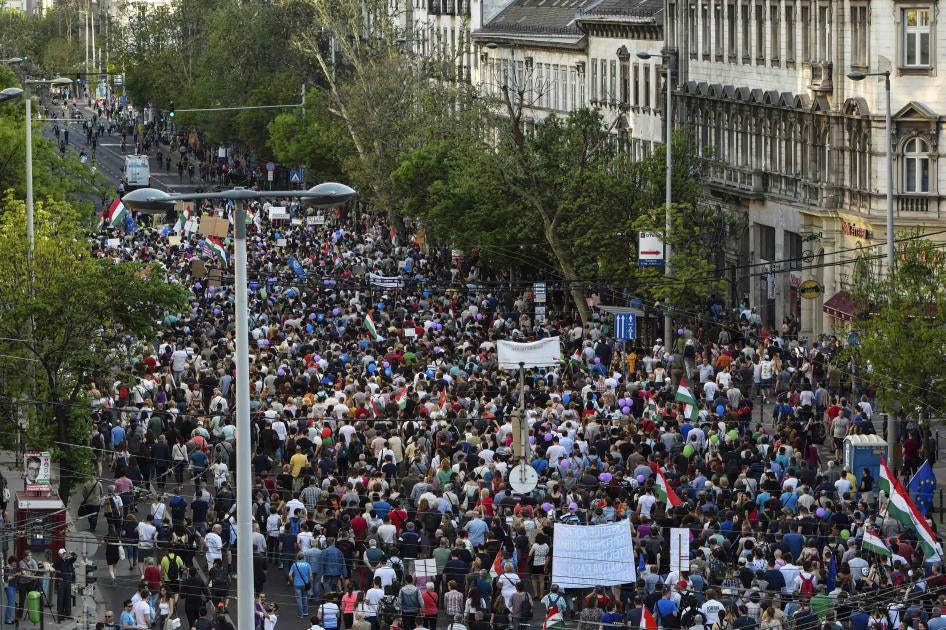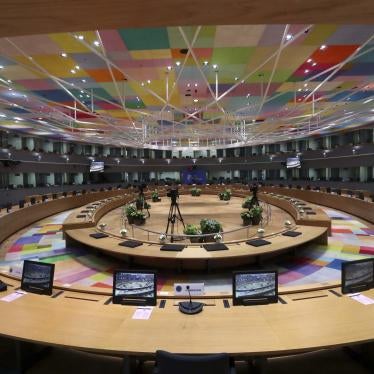(Budapest) – A smear campaign by a leading pro-government newspaper against independent journalists and activists poisons political and public debate ahead of the April 3, 2022 national elections, Human Rights Watch said today. Video clips recorded without the subjects’ consent and out of context quotes aim to show civil society activists and independent journalists in a negative light, and are part of a pattern of efforts to discredit critical voices in Hungary.
“Journalists and activists in Hungary who believed they were speaking privately are finding themselves smeared in the media with their answers twisted and taken out of context,” said Lydia Gall, senior Europe and Central Asia researcher at Human Rights Watch. “This is the latest in a long series of attacks on critics in Hungary based on dubious information ahead of elections and at other times that suit the ruling party.”
The pro-government daily newspaper Magyar Nemzet on February 2 published the first of a series of articles claiming that civil society activists and independent journalists are plotting to control international media coverage of Hungary. The most recent was published on March 2. Magyar Nemzet based its articles on material it said was sent to the newspaper anonymously containing secretly recorded video clips of activists and journalists. The clips apparently come from bogus job interviews in the summer and fall of 2020 presumably offered to entrap the activists and journalists into making questionable statements.
Human Rights Watch spoke to five people targeted by the bogus interviews, four of them featured in the articles and a fifth person whose interview has not yet been published.
Within hours of Magyar Nemzet publishing the first article in the series, the government spokesperson, Zoltan Kovacs, posted lengthy blogs about them on the government website. The post and others, after the newspaper published subsequent articles in the series, included videos of the interviews that had been posted on the government YouTube channel, suggesting coordination between the newspaper and government.
Shortly after the first publication, government officials, including Prime Minister Viktor Orban, publicly endorsed the daily’s false conclusions without questioning how the information was obtained or the misleading way it was presented. Tamas Deutsch, a European Parliament member from the Fidesz governing party, circulated a letter on Feb 16 to other European Parliament members referring to the articles.
Magyar Nemzet, which publishes in Hungarian, translated the articles and captioned the videos in English, German, and French. The paper publishes a limited selection of its content in English and rarely publishes articles in German or French.
The smear campaign is reminiscent of a similar scheme in 2018, when an alleged foreign security company approached organizations working on migration and asylum trying to entrap activists into admitting criminal conduct. It also comes on the heels of revelations of three cases of Pegasus spyware installations in Hungary in November 2021, including on a Hungarian journalist’s phone. The same journalist was also targeted directly by the people responsible for the bogus job interviews.
Four of the people Human Rights Watch interviewed said that they had responded to a job ad on LinkedIn in which an unnamed investor claiming to be using a London-based recruitment firm was seeking to start a small nongovernmental group focused on human rights abuses in Central and Eastern Europe, including Hungary, during the Covid-19 pandemic.
Those interviewed said that during the process, they had one or two video or phone calls in English with a person claiming to work in human resources asking broad questions about the political climate in Hungary, the relationship between nongovernmental groups and media, and the ability of these groups to influence the media.
Three of the targets subsequently had a video call with a person claiming to be the wealthy anonymous investor, in which one said they had been asked by the investor “Can you bribe journalists?” Two of the interviewees stated that some questions appeared leading and for information gathering purposes rather than based on their suitability for the announced position but justified responding due to the purported investor’s apparently rudimentary knowledge of Hungarian politics.
All five people said that they were never informed that the interviews would be recorded nor asked to consent to the publication of their statements. They didn’t say that the video clips were manipulated, but that the accompanying articles falsely characterized what they said and that their quotes were in some cases taken out of context. They said that Magyar Nemzet did not ask them for comments prior to publication, which good journalistic practice would require.
In a Magyar Nemzet article published on February 23 Orsolya Jeney, the former director of Amnesty Hungary, is misquoted in several places in the accompanying article. Other quotes attributed to her do not appear in the released video clips. Jeney provided Human Rights Watch a line-by-line comment on the Magyar Nemzet article in which she was featured, indicating where quotes had been misconstrued, exaggerated, or fabricated.
Similarly, one person speaking in the leaked video about how nongovernmental groups talk to trusted journalist contacts and recommend other sources for them is misquoted. The article also claimed the person was in a much more senior position than they were. In an interview published on February 3, featuring a freelance journalist, Kalman Matyas, the headline reads “NGOs control foreign media” while in the video Matyas talks about how groups have contacts with trusted journalists and refer them to other persons or groups of interest.
Those interviewed said the articles have cause harm both to them and more broadly. One person, who wished to remain anonymous, said: “I feel violated and afraid. I shut down my Facebook account immediately. This might affect me getting a job in the future as I cannot escape it as it’s everywhere.”
Jeney said that in addition to making those quoted feel humiliated and tricked, the out-of-context publications could have a chilling effect on other activists and journalists. Marton Asboth, a staff member from the Hungarian Civil Liberties Union, said that “I will be much more careful in the future.”
In addition to the people featured in the published videos, Human Rights Watch is aware of several other activists and journalists who were approached by email or through LinkedIn in very similar circumstances, suggesting a carefully orchestrated scheme aiming to entrap and then discredit government critics. They did not participate in interviews.
The Fidesz government has a long track record of attempting to silence critics, including by criminalizing civil society activities related to migration, requiring organizations funded from abroad to register as foreign funded, and through pro-government media demonizing and smearing members of civil society and the independent press. The government should refrain from engaging in or amplifying unfounded criticism of civil society and independent journalists, Human Rights Watch said.
“The publication of these attack pieces by a pro-government mouthpiece just two months before national elections, raises serious questions about who benefits from this and who the responsible parties are,” Gall said. “Deliberately smearing and intimidating critics to silence them has no place in an EU member state.”









